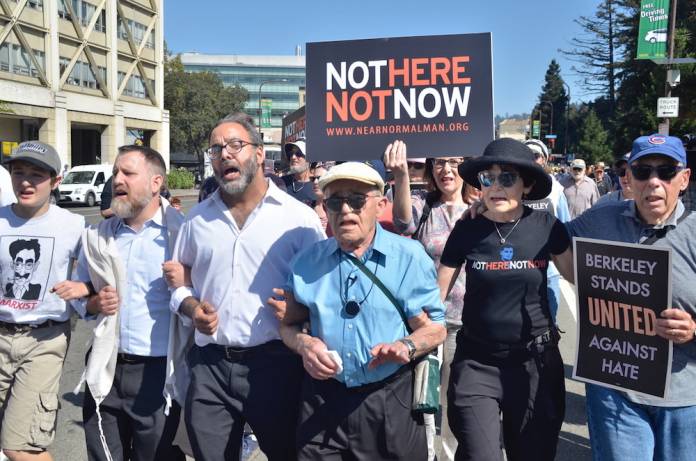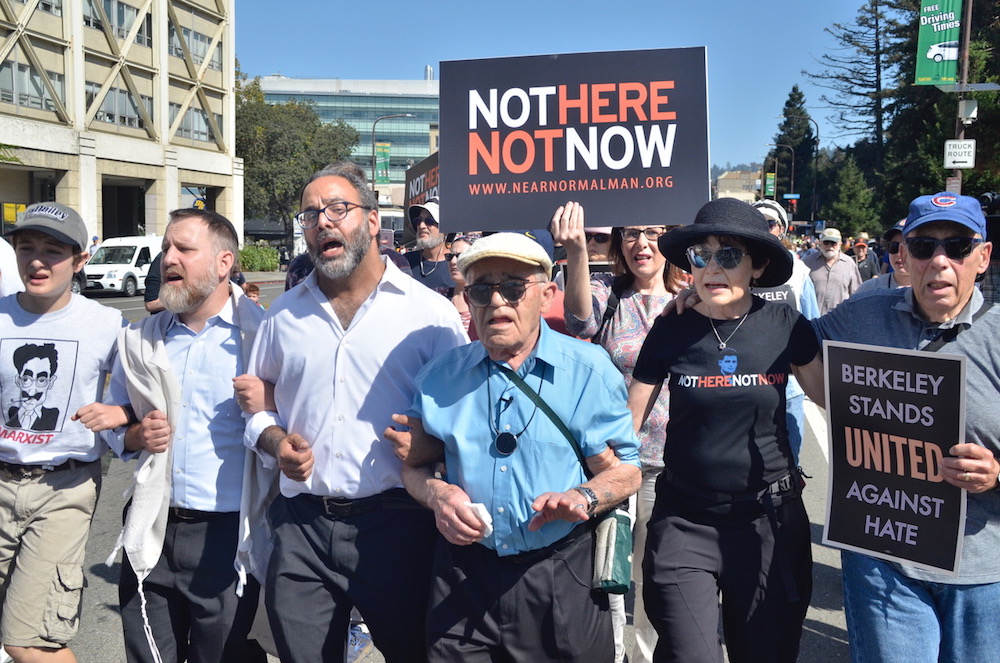
Two forces have been constants in Ben Stern’s long life: his exposure to racial hatred and violence, and his certainty that he has a responsibility to be kind to others and to stand up to that hate. Those strands came together on Sunday, when a right-wing group planned a rally in Berkeley—and Stern, a Warsaw-born Holocaust survivor, led a peaceful counter-march.
Flanked by two rabbis and his daughter Charlene Stern, the 95-year-old led more than 100 supporters on a half-mile walk to the site of a larger rally in front of the UC Berkeley campus. Then he climbed, with a little help, onto the flatbed truck that served as a stage. He urged people to resist and “rise above hatred” — and to remember the 60 million people who lost their lives in World War II.

Stern grew up in Warsaw and Mogelnice, a small town outside the Polish capital, one of eight brothers and one sister. His family moved to Mogielnice when Ben was six years old to take over a small business run by an uncle who left the country.
His grandmother and mother ran the family business, a general store that sold alcohol and groceries, along with homemade seltzer and ice cream; his father, a deeply religious man, studied Torah.
One of his early memories of anti-Semitic hatred came on a Saturday morning when he was seven years old and walking alone to synagogue. He passed the store of a Polish butcher and the butcher’s daughter, a classmate at his school, rubbed a handful of ground pork into Ben’s face.
“I ran home crying,” he remembers. “I still carry that scene today.”
He also learned to resist. At the end of each day, when he and other kids left the Jewish school they attended in the afternoons, he and other boys would gather to protect each other and the girls against attacks from stone-throwing Polish children. “If they picked fights,” Ben recalls, “we were there to respond.”
On Thursday afternoons, he and other boys collected money from Jewish businesses so his grandmother and mother could buy food to cook meals for hungry families. Ben’s father taught him lessons from the Shulchan Aruch, a text of Jewish law, with precepts about the importance of tzedakah, or righteous charity.
Help us save local journalism!
Every tax-deductible donation helps us grow to cover the issues that mean the most to our community. Become a 48 Hills Hero and support the only daily progressive news source in the Bay Area.
“I carried (those lessons) continuously in me,” Stern says, and he credits them for giving him the strength and mental toughness to survive. “The teaching of responsibility toward other people carried me through the concentration camps, encouraging me to hang in there, to live.”
After Nazi Germany invaded Poland in 1939, Ben’s family was forced to move into a small shack in the part of Mogielnice where Jews were confined. Ben was 17 years old. In late 1940, they were moved again, this time to the Warsaw ghetto, where more than 350,000 Jews were imprisoned in desperately overcrowded tenements, surrounded by barbed wire.
His grandmother, both parents, and two brothers lived with him in one small room with no running water, toilet, heat or electricity. In a four-month period in 1942, he lost his grandmother, his older brother and, on the last day of Passover, his father.
Stern took his father’s body to the cemetery and buried him but when he came back the next day to place a marker, found that his grave had been dug up. He described his feelings in a documentary film directed and produced by Charlene Stern. “I was embarrassed, angry, hurt to see my father naked in the grave,” he says. He used his hands as shovels to again cover his father’s body with dirt.
On August 15, 1942, Stern and his mother and surviving brother were ordered out of their room and placed in a line on the street. “I was pushed to the left and they were pushed to the right,” he says. “It was the last time I saw members of my family.”
He learned later that they had been sent to the Treblinka concentration and died there in the gas chambers. Ben was taken to Majdanek, another concentration camp. He remembers the four chimneys of the crematorium there, where the flames reached even higher than the smoke.
“You could go insane on the spot,” he says. “But I decided to go on, I didn’t give up.”
Stern spent almost a year in Majdanek, working in the kitchen, until he was sent to Auschwitz in July 1943. He was transported by train, along with survivors of the Warsaw ghetto uprising, which had just been crushed after a month of resistance. At Auschwitz, he was tattooed on his forearm with a number, 129592, along with a triangle classifying him as dangerous.
At Auschwitz, he and other prisoners were forced to strip for inspection by Josef Mengele, the barbaric Nazi physician who experimented on Jewish prisoners. Mengele selected Stern by pointing at him with a stick, but when Stern stepped forward, he misreported his number. The next day, when the incorrect number was called out, no one responded. Somehow, Stern’s trick wasn’t discovered.
Other memories still haunt him – like the people who no longer wanted to live going at night to the electric fences to electrocute themselves. He remembers being forced to spread human ashes on the surface of roads he was repairing. When he found small pieces of bone, he would put them aside and bury them later, saying kaddish, the Jewish prayer for the dead.
In April 1945, as the Soviet Army was advancing into Poland, thousands of prisoners, including Stern, were herded out of Auschwitz on a death march into territory still held by the Reich. The first night, many froze to death as they lay in a snowy open field. Stern tore the blanket he’d been issued in half, wrapping the pieces around his feet to protect them. When the blanket soaked through, he walked barefoot.
The marchers, he recalls, were like “half-skeletons walking.” People who couldn’t keep up were shot and left in the forest. On May 8, 1945 – the day of the German surrender — Nazi soldiers put the surviving prisoners into barracks and set dynamite around it, then fled into the forest. Somehow, the dynamite never went off. The American Army arrived two hours later, liberating the 156 prisoners who had survived the 33-day death march. Ben Stern was one of them. He was 24 years old and weighed 78 pounds.
Stern was kept in quarantine for the next 30 days and then began hunting for members of his family. He visited cities and displaced persons camps but found no one from his family. He did, however, meet Helen Kielmanowicz, another survivor, in the Bergen-Belsen displaced persons camp, and married her six weeks later. The couple traveled to the United States and settled in Skokie, Illinois in 1946.
Ben got a job in a furniture factory making 75 cents an hour and then, with the help of a cousin, bought a laundry business that he built into a chain of Laundromats, enabling the couple to raise three children and put them through college.
Postwar Skokie drew an enormous number of Holocaust survivors and Stern got involved with a survivors’ organization. When a neo-Nazi group, the National Socialist Party of America, announced its intention in 1977 to organize a march through the streets of Skokie, the survivors’ community fought to block the march. Stern led the fight and even challenged his rabbi, who, in a sermon, advised the Skokie survivors to stay home and cover their windows when the Nazis marched.
“I jumped up and said, ‘rabbi, you are wrong,’” Stern recalls. “’We are not going to close the windows, we’re not going to stay home. We will meet them head on and we will not permit them to march.’”
The survivors challenged the Nazi’s request for a permit and a legal battled waged in the courts – with the ACLU supporting the Nazi’s right to free speech. Stern wrote letters to newspapers, organized a petition drive opposing the march and urged people to come to Skokie for a counter-demonstration. He received death threats and bought a gun for protection. Eventually, faced with the prospects of a huge counter-demonstration, the Nazis held a small march in Chicago and cancelled their plans for Skokie. Stern smashed his gun to pieces with a hammer.
Nine years ago, Ben and Helen moved to Berkeley to be closer to their daughters and grandchildren. Ben now walks every day to visit his wife, who lives in a nearby eldercare community.
Stern sees parallels between the political climate of the U.S. today under Donald Trump and the rise of European fascism in the early 1930s, and it frightens him.
“The threat is there,” he says. “I’m very worried. I don’t want to bring out the worst but he seems to be offering dictatorship in this country.”
For Stern, leading the march on Sunday was a continuation of a pledge he made decades ago.
“I’m filling the promise we made at Auschwitz and the other camps,” Stern told me. As people were led to the gas chambers, he said, “they turned around and said ‘Remember me, remember us.’ I have the obligation, on their behalf, to expose, to speak about the threat of Nazism.”
“Schools, religious institutions, community organizations, libraries and museums can purchase “Near Normal Man,” Ben Stern’s personal story of survival through courage, kindness and hope here.

great article, Rob